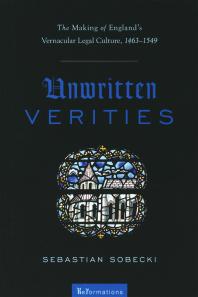(Ebook) Unwritten Verities : The Making of England's Vernacular Legal Culture, 1463-1549 by Sebastian Sobecki ISBN 9780268092900, 0268092907
In "Unwritten Verities: The Making of England's Vernacular Legal Culture, 1463-1549, " Sebastian Sobecki argues that the commitment by English common law to an unwritten tradition, along with its association with Lancastrian political ideas of consensual government, generated a vernacular legal culture on the eve of the Reformation that challenged the centralizing ambitions of Tudor monarchs, the scriptural literalism of ardent Protestants, and the Latinity of English humanists. Sobecki identifies the widespread dissemination of legal books and William Caxton's printing of the Statutes of Henry VII as crucial events in the creation of a vernacular legal culture. He reveals the impact of medieval concepts of language, governance, and unwritten authority on such sixteenth-century humanists, reformers, playwrights, and legal writers as John Rastell, Thomas Elyot, Christopher St. German, Edmund Dudley, John Heywood, and Thomas Starkey. "Unwritten Verities" argues that three significant developments contributed to the emergence of a vernacular legal culture in fifteenth-century England: medieval literary theories of translation, a Lancastrian legacy of conciliar government, and an adherence to unwritten tradition. This vernacular legal culture, in turn, challenged the textual practices of English humanism and the early Reformation in the following century. Ultimately, the spread of vernacular law books found a response in the popular rebellions of 1549, at the helm of which often stood petitioners trained in legal writing. Informed by new developments in medieval literature and early modern social history, "Unwritten Verities" sheds new light on law printing, John Fortescue's constitutional thought, ideas of the commonwealth, and the role of French in medieval and Tudor England. "Sebastian Sobecki's lucid and lively study seeks to address a major lacuna in the current understanding of English vernacularity from the fourteenth to the sixteenth centuries: English common law. This huge body of knowledge and practice, written and unwritten, awaits focused attention from historians and literary historians, particularly in the light of new scholarship on Anglo-French vernacularity in this period. Sobecki's ambitious, original, and deeply considered account includes such figures as John Fortescue, John Rastell, and Christopher St. German and their investments in and influence on early Tudor commonality. The range and intelligence of his approach to this material, his ability to think beyond period and disciplinary boundaries, and his alertness to the complex bilingual condition of English intellectuals add a compelling dimension to the debate on the linguistic and political shapes of insular identity in these centuries." --Ardis Butterfield, John M. Schiff Professor of English, Yale University ""Unwritten Verities" proposes an arresting and original thesis: that the English common law's commitment to an oral tradition permitted it, on the eve of the Reformation, to become a transformative repository for notions of consensual government, of the inwardness of spiritual jurisdiction, and of the preeminence of English. This elegantly written and engagingly controversial book will stimulate literary scholars, legal historians, and historians of political thought to look afresh at some of their fundamental assumptions about English literature, politics, and the law at the turn of the fifteenth century." --Lorna Hutson, Berry Professor of English Literature, University of St. Andrews
*Free conversion of into popular formats such as PDF, DOCX, DOC, AZW, EPUB, and MOBI after payment.


